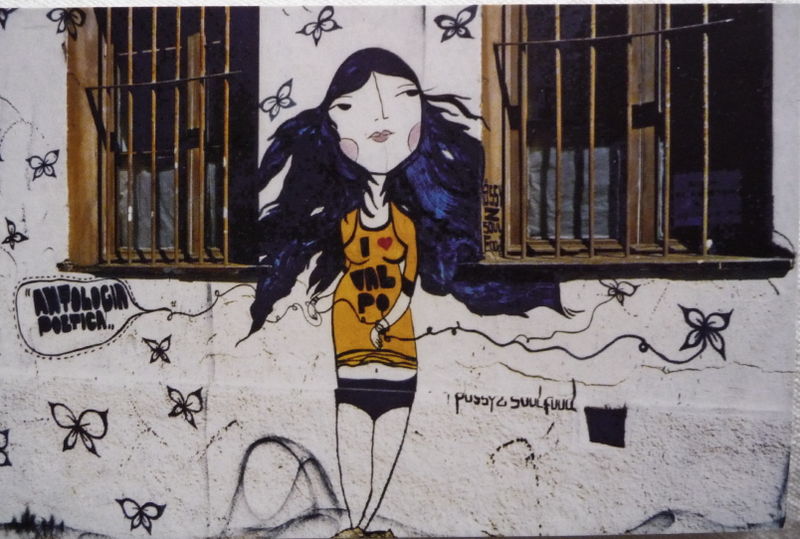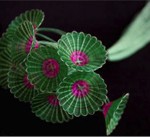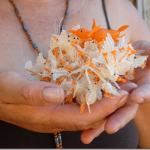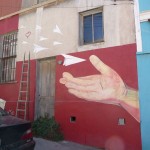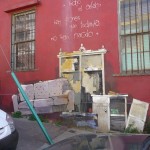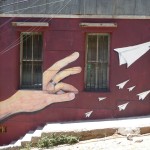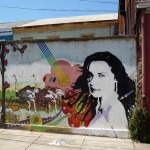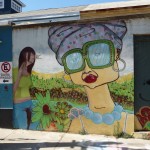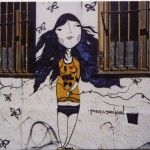Chile: Culture, Children’s Books and Crafts for Kids
As I researched Chile, I found another Nobel winning poet, Gabriela Mistral. Two Nobel poets from one small country?! The souls of Chileans are truly steeped in poetry, optimism and beauty. At least, that is what I conclude after looking at what they can do with horsehair, graffiti and mere words!
KidLit
Mia’s Story by Michael Foreman
This is a beautiful story about a little girl and her family who live near and off the village dump in Chile. Mia and her family scavenge for scraps that they resell, making a meager living. When Mia’s dog disappears, she journeys high into the mountains to find him, where she finds clean air and a field of lovely white flowers. She finds her dog and brings some flowers back. Carefully tending these flowers, Mia starts selling them and soon her father joins her. Despite their difficult life, this story is optimistic as Mia dreams of one day living in a brick house. [picture book, ages 6-12]
The Dreamer by Pam Muñoz Ryan
Pam Muñoz Ryan brings to life the story of young Pablo Neruda, a Nobel Prize Laureate for Poetry. He had a difficult boyhood in Chile as the oldest son of a domineering father who didn’t understand his son’s dreamy creativity. Instead, his father pushes him to be tougher and pursue a more traditional career path. It’s clear that his father is not a likable person and Pablo (known then as Neftalí Reyes) takes after his deceased mother. Luckily Pablo has a kind stepmother who nurtures and encourages him. I found this chapter book to be sad but was delighted to learn about Neruda and discover his poetry as he is not well known in the United States. [chapter book, ages 9-14]
City of the Beasts by Isabel Allende
City of the Beasts begins with the story of Alexander Cold, who is 15 years old and going through a family crisis. While his parents leave for Texas to try to treat his mother’s cancer, Alex and his sisters are sent to live with their grandmothers. Despite his desperate pleading, Alex is sent off to New York City to stay with his eccentric grandmother Kate Cold,a reporter for International Geographic Magazine. His sisters, however, are sent to live with their Grandmother Carla. Meanwhile, Kate announces that she will be taking Alex with her to the Amazon rainforest during his visit. Once Alex arrives in New York City and finds out that his grandmother had no intentions of collecting him at the airport and is forced to walk to her apartment, several blocks away. In the process, he meets a girl named Morgana who is a very eccentric and attention-getting girl in her mid-20s. She steals his backpack that contained his clothes, his money, and his flute. He is greatly saddened by the loss of his precious flute, but Kate gives him the flute belonging to his grandfather, Joseph Cold. from Wikipedia [young adult]
Nobel Poets and Notable Authors
“The country is home to a couple of Nobel Prize poets including Gabriela Mistral and Pablo Neruda. Their homes have actually been turned to museums. A number of contemporary Chilean authors have gained recognition around the world as well. The author of the House of Spirits, Isabel Allende and the author of Love and Shadows, Eva Luna are among the best Chilean international sellers.” Country Facts

 Eva Luna series by Isabel Allende
Eva Luna series by Isabel Allende
Nobel Prize Speeches from Chilean Winners
Your Royal Highnesses, Ladies and Gentlemen, Pablo Neruda‘s speech at the Nobel Banquet at the City Hall in Stockholm, December 10, 1971
(Translation)
We come from far away, from that which is behind us and within us, from different languages, from countries that love one another. Here we are assembled in Stockholm, which this evening is the center of the world. We have come from chemistry, from the microscopes, from cybernetics, from algebra, from the barometers, from poetry in order to be assembled here. We come from the darkness of our laboratories, to meet a light that honors us and, for the moment, dazzles us. For us, the laureates, it is a question both of a joy and a pain.
But before I render thanks and before I take breath I must gather myself, if you will pardon me, to take myself far from this place, to return to my country and once more to go wandering in the night and the dawn of my native land.
I return to the streets of my childhood, to the winters of South America, to the lilac gardens of Araucania, to the first girl I held in my arms, to the mud on the streets which knew no paving, to the Indians mourning-clad left to us by the Conquest, to a country, a dark continent seeking for the light. And if the beams from this festive hall cross land and sea to light up my past, they also light up the future of our American peoples, who are defending their right to dignity, to freedom, and to life.
I am a representative of these times and of the present struggles which fill my poetry. You will pardon me if I have extended my gratitude to cover all those who belong to me, even to the forgotten ones of this earth who in this happy hour of my life appear to be more real than my own phrases, higher than my mountain chains, wider than the ocean. I am proud to belong to this great mass of humanity, not to the few but to the many, by whose invisible presence I am surrounded here today.
In the name of all these peoples and in my own name I thank the Swedish Academy for the honor which has been shown me today for my work as a poet. I also thank this country with the mighty forests and the deep snows, whose feeling for equality and whose love for peace, whose balance and generosity impress the world. I render my thanks and return to my work, to the blank page which every day awaits us poets so that we shall fill it with our blood and our darkness, for with blood and darkness poetry is written, poetry should be written.
From Les Prix Nobel en 1971, Editor Wilhelm Odelberg, [Nobel Foundation], Stockholm, 1972
Gabriela Mistral‘s speech at the Nobel Banquet at the City Hall in Stockholm, December 10, 1945
(Translation)
Today Sweden turns toward a distant Latin American country to honor it in the person of one of the many exponents of its culture. It would have pleased the cosmopolitan spirit of Alfred Nobel to extend the scope of his protectorate of civilization by including within its radius the southern hemisphere of the American continent. As a daughter of Chilean democracy, I am moved to have before me a representative of the Swedish democratic tradition, a tradition whose originality consists in perpetually renewing itself within the framework of the most valuable creations of society. The admirable work of freeing a tradition from deadwood while conserving intact the core of the old virtues, the acceptance of the present, and the anticipation of the future, are what we call Sweden, and these achievements are an honor to Europe and an inspiring example for the American continent.
The daughter of a new people, I salute the spiritual pioneers of Sweden, by whom I have been helped more than once. I recall its men of science who have enriched its national body and mind. I remember the legion of professors and teachers who show the foreigner unquestionably exemplary schools, and I look with trusting love to those other members of the Swedish people: farmers, craftsmen, and workers.
At this moment, by an undeserved stroke of fortune, I am the direct voice of the poets of my race and the indirect voice for the noble Spanish and Portuguese tongues. Both rejoice to have been invited to this festival of Nordic life with its tradition of centuries of folklore and poetry.
May God preserve this exemplary nation, its heritage and its creations, its efforts to conserve the imponderables of the past, and to cross the present with the confidence of maritime people who overcome every challenge.
My homeland, represented here today by our learned Minister Gajardo, respects and loves Sweden, and it has sent me here to accept the special honor you have awarded to it. Chile will treasure your generosity among her purest memories.
Prior to the speech, Professor A.H.T. Theorell of the Department of Biochemistry, Nobel Institute of Medicine, addressed the Chilean poet: «To you, Gabriela Mistral, I wish to convey our admiring homage. From a distant continent, where the summer sun now shines, you have ventured the long journey to Gösta Berling’s land, when the darkness of winter broods at its deepest. A worthier voice than mine has praised your poetry earlier today. May I nevertheless be permitted to say that we all share in the gladness that the Nobel Prize has this time been awarded to a poetess who combines magnificent art with the deepest and noblest aims.»
From Nobel Lectures, Literature 1901-1967
Chilean Artisans
UNESCO has awarded eight Chilean artisans with the 2010 Award of Excellence in Handicrafts for South America.
- Manta Makun Domo by the Asociación Indígena Relmu Witral;
- Horsehair Handicrafts by the Asociación Maestra Madre de Rari;
- Ronroco by Javier Carvajal Fuica;
- Bufanda Mariposa (Butterfly Scarf) by Felipa Condori;
- Kallwe by Valeria Martínez Nahuel;
- Cartera teatina (Theatine Bag) by Juanita Muñoz;
- Tete Pato by Juan Carlos Orellana Zapata;
- Chaya, a basket by Ovidio Melo Sánchez.
To view any book more closely at Amazon, please click on image of book.
BEST #OWNVOICES CHILDREN’S BOOKS: My Favorite Diversity Books for Kids Ages 1-12 is a book that I created to highlight books written by authors who share the same marginalized identity as the characters in their books.

